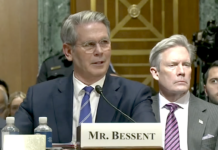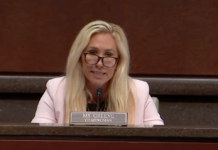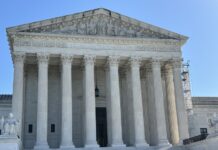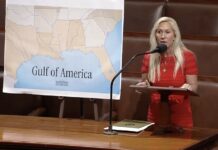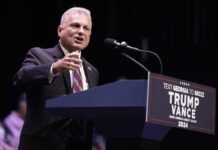
WASHINGTON (States Newsroom) — A federal judge issued a temporary restraining order Monday, blocking the Trump administration from implementing a spending freeze on grant and loan programs that was outlined in a memo released last week but has since been rescinded.
Judge Loren L. AliKhan of the U.S. District Court of the District of Columbia became the second federal judge to issue such an order, following a ruling Friday from Chief Judge John J. McConnell Jr. of the U.S. District Court in Rhode Island.
“Defendants’ actions in this case potentially run roughshod over a ‘bulwark of the Constitution’ by interfering with Congress’s appropriation of federal funds,” AliKhan wrote in the 30-page ruling.
“OMB ordered a nationwide freeze on pre-existing financial commitments without considering any of the specifics of the individual loans, grants, or funds,” she added. “It did not indicate when that freeze would end (if it was to end at all). And it attempted to wrest the power of the purse away from the only branch of government entitled to wield it.”
AliKhan also denied a motion from a Department of Justice attorney to dismiss the case, rejecting the idea that OMB rescinding the memo truly ended the freeze.
“Destroying the paper trail of allegedly illegal activity means nothing if the activity persists,” she wrote.
AliKhan issued an administrative stay in the case last week, though that expired on Monday at 5 p.m. Eastern. The two cases are expected to play out in the weeks and months ahead.
Legal fight erupted after OMB memo
The lawsuit, National Council of Nonprofits v. Office of Management and Budget, was filed in late January by several organizations one day after OMB issued the memo announcing the spending freeze on grants and loans.
Kevin Friedl, one of the attorneys representing the organizations, said during a 90-minute hearing Monday that while OMB has rescinded the memo, there are still examples of organizations that are unable to access a payment portal or receive funding from that portal.
Department of Justice attorney Daniel Schwei argued that any funding still paused is likely on hold due to one of President Donald Trump’s executive orders and not the OMB memo that led to the lawsuit.
Schwei also said that DOJ believes individual federal departments and agencies have the “discretion” to halt federal spending that Congress has already approved.
Friedl said there were numerous examples of funding still frozen that didn’t appear connected to any of Trump’s executive orders. And he told the judge there was “no evidence” that the ongoing funding freeze is the result of independent discretion from agency leadership.
Leavitt social media post
Friedl referenced a social media post from White House press secretary Karoline Leavitt, where she wrote that revoking the OMB memo was “NOT a rescission of the federal funding freeze.”
“It is simply a rescission of the OMB memo,” Leavitt wrote. “Why? To end any confusion created by the court’s injunction.”
“The President’s EO’s on federal funding remain in full force and effect, and will be rigorously implemented,” Leavitt added.
Friedl said during Monday’s court hearing that it was clear the Trump administration’s decision to rescind the OMB memo was meant to “get out from under” the administrative stay Judge AliKhan issued last week.
Schwei disagreed that Leavitt’s social media post showed the Trump administration was seeking to skirt the judge’s previous administrative stay.
Schwei urged Judge AliKhan not to issue a temporary restraining order, saying it would be duplicative, given the ruling from the Rhode Island federal judge. But, he said, that if she were to issue a temporary restraining order, it should be limited to the organizations that filed the lawsuit.
Those organizations include the American Public Health Association, Maine Street Alliance, National Council of Nonprofits and SAGE.
‘Power of the purse’ with legislators, judge says
Judge AliKhan didn’t appear to do that in her temporary restraining order.
AliKhan wrote that “(a)s evidenced by the White House Press Secretary’s statements, OMB and the various agencies it communicates with appear committed to restricting federal funding.”
“If Defendants retracted the memorandum in name only while continuing to execute its directives, it is far from ‘absolutely clear’ that the conduct is gone for good,” AliKhan wrote. “There is nothing stopping OMB from rewording, repackaging, or reissuing the substance of memorandum M-25-13 if the court were to dismiss this lawsuit.”
AliKhan rejected the Trump administration’s belief that it holds the ability to cancel spending approved by Congress, writing that its “actions appear to suffer from infirmities of a constitutional magnitude.”
“The appropriation of the government’s resources is reserved for Congress, not the Executive Branch. And a wealth of legal authority supports this fundamental separation of powers,” she wrote. “The legislature’s ‘power of the purse is the ultimate check on the . . . power of the Executive.’”
AliKhan also criticized how the Office of Management and Budget went about implementing its proposed spending freeze through a memo issued about 24 hours before the pause in grant and loan funding was set to start.
“If Defendants intend to conduct an exhaustive review of what programs should or should not be funded, such a review could be conducted without depriving millions of Americans access to vital resources,” AliKhan wrote.
The Trump administration, she wrote, could have taken “a measured approach to identify purportedly wasteful spending,” but chose instead to “cut the fuel supply to a vast, complicated, nationwide machine—seemingly without any consideration for the consequences of that decision.”
“To say that OMB ‘failed to consider an important aspect of the problem’ would be putting it mildly.”


